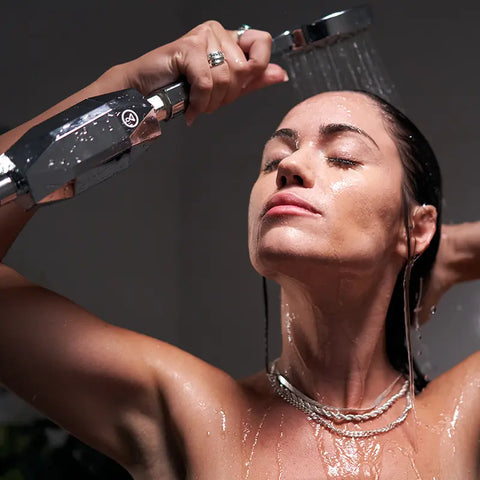The question of whether our skin can absorb chlorine from tap water is not only intriguing but also carries significant implications for our health and well-being. Chlorine is commonly used to disinfect tap water worldwide and therefore impacts most people. Therefore, the idea that this chemical could penetrate our skin during a shower or while washing hands is a topic of both concern and debate.
Introduction
Can our skin, the largest organ of the body, absorb chlorine from tap water into our system? This question has sparked numerous studies and discussions among scientists, dermatologists, and health experts. The skin is known to be semi-permeable, allowing certain substances to pass through, but does chlorine make the list?
Here, we delve into the evidence on both sides of the argument without drawing a definitive conclusion, leaving the door open for further contemplation and research.
Evidence Suggesting Skin Absorption of Chlorine
- Chlorine as a Small Molecule: Chlorine, due to its relatively small molecular size, could potentially penetrate the skin barrier, especially during prolonged exposure such as long showers (1).
- Hot Showers and Pores: Hot water can cause pores to dilate, potentially increasing the skin's absorption rates. This could allow chlorine and other chemicals in tap water to enter the body more readily (2).
- Oxidative Stress: Chlorine is a known oxidizing agent. Studies have suggested that chlorine exposure can lead to oxidative stress in skin cells, which may imply absorption as the skin reacts to its presence (2).
Sources:
(1) Chlorine Rash: Treatment and Prevention - Healthline. https://www.healthline.com/health/chlorine-rash.
(2) Drinking Water Chlorination: Frequently Asked Questions. https://www.health.state.mn.us/communities/environment/water/factsheet/chlorination.html.
Evidence Against Skin Absorption of Chlorine
- Skin's Protective Barrier: The skin is designed to protect against environmental hazards. Its outermost layer, the stratum corneum, acts as a barrier to prevent the entry of foreign substances, including chlorine (3).
- Rapid Evaporation: Chlorine can evaporate quickly, especially when exposed to air. This rapid evaporation could mean that less chlorine is available to be absorbed by the skin during typical water usage (4).
- Limited Penetration: Research indicates that while small amounts of chlorine can pass through the skin, it is not absorbed well and is rapidly eliminated from the body, suggesting minimal overall absorption (4).
Sources:
(3) Is Tap Water Ruining Your Skin? A Dermatologist Tells All - Newsweek. https://www.newsweek.com/skincare-water-tap-acne-filter-dermatologist-1795064.
(4) Chlorine Skin Effects - Comprehensive Guide to Protect Your Skin. https://www.cleanwaterstore.com/blog/chlorine-skin-effects-guide/.
Chlorine skin absorption test with color
The chlorine color test has become a popular demonstration online to demonstrate that the skin absorbs chlorine. But is this true?
In this test, individuals add a few drops of a chlorine reagent to two separate glasses of tap water. They then immerse a hand in one glass, often making a scissor motion with their fingers, while leaving the other glass untouched. After a short period, the water in the glass without the hand typically remains yellow, indicating the presence of chlorine, while the water in the glass with the hand often shows a significant color reduction or even clears up, suggesting that the chlorine has been absorbed by the skin.
Here's an example:
This visual experiment is shared with the claim that it demonstrates how quickly and effectively the skin can absorb chlorine from water. However, there are several other explanations for this:
a) the agitation of water by the hand could accelerate the evaporation of chlorine
b) the oils and other substances on the skin could react with and neutralize the chlorine (5).
It's important to approach such demonstrations with a critical mind and consider all possible explanations. While the test is compelling, it does not conclusively prove that the skin absorbs chlorine, and further scientific investigation is necessary to validate these claims.
Sources:
(5) Is chlorine in water absorbed quickly through the skin?. https://skeptics.stackexchange.com/questions/6539/is-chlorine-in-water-absorbed-quickly-through-the-skin.
(6) Unveiling the Secret: How Your Body Absorbs Chlorine in Pools. https://pooltipsusa.com/unveiling-the-secret-how-your-body-absorbs-chlorine-in-pools/.
How can I avoid skin exposure to chlorine?

With the uncertainty around chlorine absorption through the skin as well as chlorine by-products in general it's probably better to be safe than sorry. A high quality indepedently tested shower filter like ShowerPro Diamond you will reduce chlorine exposure by up to 99%.
Conclusion
The scientific consensus appears to lean towards the notion that while the skin may absorb small amounts of chlorine from tap water, this absorption is limited and chlorine is rapidly eliminated from the body.
The evidence suggests that the skin's barrier is quite effective at protecting against chlorine penetration during everyday exposure to tap water. However, individual sensitivity and environmental factors could influence absorption rates, and thus, the topic remains open for further investigation and discussion (7 and 8).
In summary, while there is evidence both for and against the skin's absorption of chlorine from tap water, the prevailing scientific view is that any absorption is minimal and unlikely to pose significant health risks under normal conditions. Nevertheless, the debate continues, underscoring the need for ongoing research to fully understand the interaction between our skin and the chlorinated water we encounter daily.
Additional Sources:
(7) Processes | Free Full-Text | Long-Term Skin Safety Effect of Chlorine .... https://www.mdpi.com/2227-9717/11/7/1914.
(8) Is Chlorine in Tap Water Really that Bad - Dr. Berg. https://www.drberg.com/blog/is-chlorine-in-tap-water-really-that-bad.
(9) More evidence that sunscreens absorb through skin. https://cen.acs.org/safety/consumer-safety/evidence-sunscreens-absorb-through-skin/98/i4.
(10) Chlorine Skin Absorbtion | Arizona Whole House Water Filter | H2O Concepts. https://h2oconcepts.com/health-concerns/chlorine-skin-absorbtion/.
(11) Absorption of chemicals through compromised skin - HHRA. https://hh-ra.org/wp-content/uploads/2021/04/Kezic-Absorption-of-chemicals-through-compromi.pdf.
(12) Certain indoor air pollutants can be absorbed through the skin – here’s .... https://theconversation.com/certain-indoor-air-pollutants-can-be-absorbed-through-the-skin-heres-what-you-need-to-know-220930.





